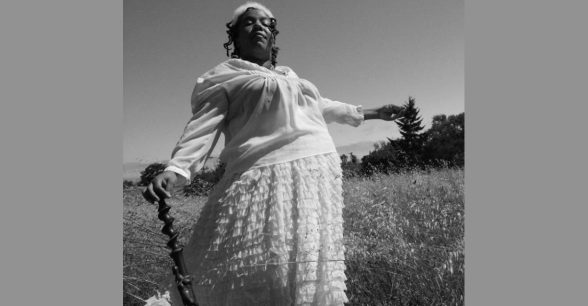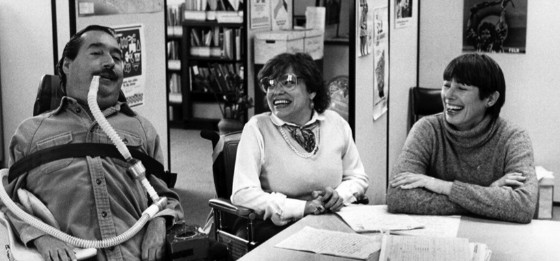You Are Not A Burden: On Disability, Dating, and Support Needs
Dating with a disability can be hard. As an autistic person with a physical disability, chronic pain, and a few mental health disabilities, I face a lot of drama when it comes to dating. Disability is baked into every phase of the process, from seeing me for the first time (seeing my scooter, my limp, my glasses) to the first date (Is it metro accessible? Overstimulating?) to sleeping over the first time (CPAP, night guard, the lights have to stay on).
Not everyone is automatically up for that, especially if you, like me, have ended up dating people whose disabilities don’t match up with yours. (Most of my partners have also been autistic, and dealing with mental health disabilities, but none have shared my physical disability at the time we’ve dated.) While I can only speak from my own experience, I’ve picked up a few lessons that I follow based on past experience.
I have a right to control how I handle my disability – without my partner.
When my able-bodied partners recognize that my disability involved something they considered to be a sign it was super serious (i.e., a CPAP, more than 5 medications, mobility aids), they often make the mistake of assuming that they need to integrate themselves as my caretaker. They’ll make assumptions about what I can and can’t do, and push me accordingly. (“You should walk more! Come on, let’s go up the street to the coffee shop, you’ll feel great afterwards.”) In reality, that isn’t their choice to make. I know my body, and I am in charge of it, and how much I push it and for what purpose on any given day. I don’t need a partner to become my personal care attendant (PCA) by default.
I’ve made it a point to start directly telling my partners, “My physical limits and my medical decisions are not something I’m willing to debate” or “That isn’t your decision.” If the behavior persists, I’ve made the choice that I will leave them. Respecting my independence and my right to bodily autonomy is not optional.
Sometimes, disability requires planning. That’s not the same thing as me being inconvenient.
As someone in my early twenties, many of my partners have been incredibly spontaneous. That can be fun! Sometimes, my partners were interested in parties, dancing, or going to museums on a whim. They were used to being able to call on their partners and, with little more than a few words (“Let’s go white river rafting!”) being able to go. Then, they dated me.
For my body, some activities require planning.
For example, if I wanted to go rock climbing, I would have to:
- Find an adaptive rock climbing location
- Take MetroAccess or the Metro there on my scooter
- Which means checking that the elevators are working
- Plan on having at least a day afterwards to decompress from the physical activity.
That’s all totally fine by me! I know my body and how to plan for it, but I expect my partner to extend me the courtesy of asking, “Hey, what would this involve for you? Would it be helpful for me to look up any of this information beforehand?” For some of us, this is a process that might take a day or two, for some of us a few hours.
Regardless of how long it takes, that doesn’t make us a burden. It just means we have a different set of physical considerations. It’s an access need, just like my noise cancellers or my scooter. It’s okay for my partner to need a little time to get used to these things, but I refuse to let anyone treat me as a burden because I need to prepare. It’s just a part of my life.
My Disability Isn’t About Them
I’ve had the misfortune of many of my partners making my experiences as a disabled person into their problem. For example, during a conference, one of my first partners offered to push my manual wheelchair. She had a hard time physically pushing me and navigating the city curbs. I gave her an out several times (we were in a big group, so I asked if she was sure she didn’t want someone to take over), but she insisted on continuing because it was a way to prove that she cared for me and that my disability wasn’t an obstacle. I thought it was romantic at first, until I saw her in person again when I had my motorized scooter and she cheered how great it was that she “wouldn’t have to push me anymore.”
This isn’t an isolated incident. I can recall a rushed outing to the pride parade, planned at the last second by my then-boyfriend. When I asked him where we were planning on parking and how he planned on getting us to seating, he said, “I don’t know,” and became gradually more upset when I asked if he’d thought about how I was going to get my body from wherever he parked to the main parade area, or if anyone would be able to help push me if I got exhausted. Finally, he burst out, “You’re complaining on purpose to make me feel guilty!”
In both cases, the problem here is the same: my partners took my disability personally, and saw it as an obstacle to overcome rather than an inherent part of me. This made me feel awful, because it felt like a part of my identity was a problem to them. I felt guilt, but also anger. As someone who takes pride in my disability, I want my partner to as well. I’ve since decided that I want a partner who doesn’t ignore my disability, but accepts that they’ve got to work with it–because it is me, and it always will be.
Sometimes, I can just have fun-and that’s allowed!
It may come as a surprise to some, but I don’t always end up dating the people that I have dates with. Sometimes, I have one-off dates, or a handful, or only see someone casually. Not everyone becomes a long-term partner, and I’m okay with that!
One of the coolest things I’ve learned as someone who’s still figuring myself out is that I’m allowed to just do things for fun with cool people. Friend from a genderqueer group that there are some sparks with? Let’s go to the park, and spin around in a ModCloth shop! Maybe it’ll lead somewhere, maybe it won’t, but right now it’s enjoyable. Want to give someone a kiss on the cheek just to make them giggle? Ask for consent, and if you have an enthusiastic yes, go for it! Aching to go out into the countryside and spend a day among some flowers? Get together a group of friends, romantic and otherwise, and plan to rent a van with a ramp for a day! The possibilities are endless.
One of the hardest things, I think, as someone with a bunch of disabilities, is that it can feel like our happiness and ability to do things is tied to others. And sometimes, maybe it is. Interdependence is scary, sometimes, but it can also be beautiful-and it’s lead to some of my greatest adventures. Between friends and lovers, there’s a lot I can do that I never imagined possible-and it’s only the beginning.
About Rooted In Rights
Rooted in Rights exists to amplify the perspectives of the disability community. Blog posts and storyteller videos that we publish and content we re-share on social media do not necessarily reflect the opinions or values of Rooted in Rights nor indicate an endorsement of a program or service by Rooted in Rights. We respect and aim to reflect the diversity of opinions and experiences of the disability community. Rooted in Rights seeks to highlight discussions, not direct them. Learn more about Rooted In Rights




Yea that’s very true, I am physically challenge due to polio from the age of 4 left me limping till date. I was brought up in a culture where men would not want to seen dating a challenged girl/lady majority of people view it as taboo.
I find it difficult to fall in love even when I try, some would want to flow along but at some point when I began to go emotional I get a turn down.
That usually leave me miserable, frustrated, depressed.
Some will, from beginning see me as a burden to hard to carry.
Yes, I know I have not found true love yet but I believe I will soon. And until then I will continue to make people understand that disability should not be seen as a burden, it’s just a challenge and just like challenges can be overcome that’s how challenges that results from disability can.
But my question is can there be a time when disability will be completely eradicated?
Dinah Shore had polio as well as Bill Cullen. Both achieved fame in their time I had a neighbor that had polio and achieved a PhD in math and taught in NYU.